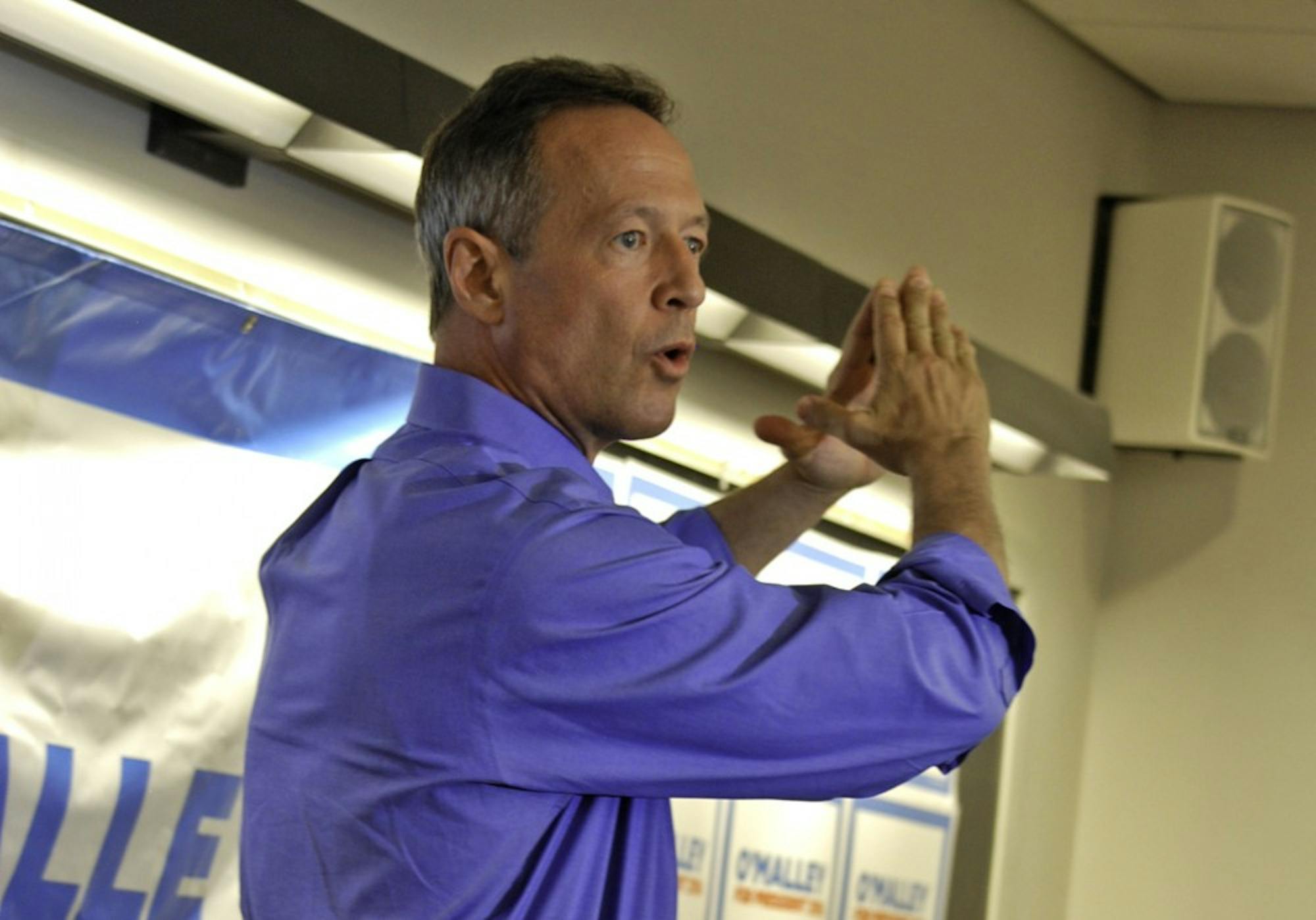Just a day after launching his presidential campaign, former Maryland governor Martin O’Malley (D) stressed the political virtue of inclusion and his executive experience in a speech to students and community members on Sunday night in Carson Hall.
O’Malley, touting his progressive record, touched upon his views on a wide array of issues — including increasing discipline on Wall Street, gay marriage, immigration reform and his experience as governor and as Baltimore mayor — during his 30-minute speech and question-and-answer session.
“One thing I’ve been struck by is big generational shift underway in our country, a shift to the better,” he said. “As I’ve traveled around the country, I’ve rarely met someone under 40 who denies climate change is real. I rarely meet anyone under 40 who wants to scapegoat immigrants. I have also rarely met anyone under 40 who hates gay people or gay couples.”
As governor of Maryland from 2007 until his term expired earlier this year, O’Malley oversaw many progressive legislative actions: he supported the implementation of the Affordable Care Act, strengthened gun laws and repealed the death penalty. He also signed legislation allowing for in-state tuition for undocumented immigrants at Maryland’s public universities.
O’Malley lambasted wealth concentration and the notion of trickle-down economics, and stressed the need to put wage policies at “the center of our thinking.” As governor of Maryland, O’Malley signed a bill raising the minimum wage to $10.10.
In the same vein, he stressed the need to follow through on the promises to regulate Wall Street.
“If a bank is too big to fail, we need to break it up before it breaks us up,” he said.
Prior to serving as governor, O’Malley was the mayor of Baltimore for eight years.
O’Malley said that he is the only Democratic candidate so far with any executive office experience.
In order to decrease extremely high crime rates, O’Malley instituted a zero-tolerance police policy, where police forces were encouraged to make arrests for small offenses, the rationale being that stopping these smaller crimes would help create an environment where more serious crime does not occur.
When asked about police brutality, O’Malley said that the federal government can do a better job of regulating police forces.
One audience member asked what O’Malley thought of current rival and presumed Democratic frontrunner Hillary Clinton’s tenure as Secretary of State. O’Malley responded by saying that while she worked hard to be a face of the administration during a time of much needed repair, the country needs a new foreign policy strategy which includes collaboration and making new regional alliances.
“We have shown ourselves more eager and adept at toppling regimes and not seeing what follows those regimes,” he said.
Compared to other contenders in the Democratic field so far, like Clinton and Senator Bernie Sanders (D-VT), O’Malley is relatively unknown on the national level and has thus far garnered little support from other Democratic politicians. In a Washington Post and University of Maryland poll conducted of Maryland Democrats in October, just 3 percent of respondents said they would support O’Malley. In comparison, 63 percent of voters said at the time they would vote for Clinton.
Government professor Deborah Brooks, whose area of expertise includes polling, said that these early numbers mean nothing for O’Malley. Several candidates in the past have polled low early and have then gone on to perform well in the primaries.
“People haven’t been thinking about him in a presidential capacity yet,” Brooks said in an interview after the speech. “If he can start to get media coverage in a presidential capacity, he will potentially be seen in a presidential light.”
Brooks entertained the possibility that O’Malley might be lining himself up as a potential vice presidential candidate.
State representative Sharon Nordgren (D-Grafton) said that although she is a Clinton supporter, she thinks it will be good to have O’Malley in the race. Nordgren, who has not given an official endorsement, was named by The Boston Globe as one of the most important endorsements to obtain in the Democratic New Hampshire primary.
“I think especially in New Hampshire the Clintons are more well known, and New Hampshire has one of those places where they’ve had a lot of following,” Nordgren said in an interview before the speech. “Mostly he has to get known up here so people can identify him with his positions.”
Peter Mason, a resident of Lebanon, said that he is looking for a more progressive alternative to Clinton, and that O’Malley’s approach to income inequality and social justice are things that strongly resonated with him during the speech.
Alex Witherspoon ’18, who is from Baltimore, said although O’Malley is a good speaker and has interesting ideas, he probably would not vote for him because he believes O’Malleys zero-tolerance policy led to the Baltimore riots, and that Baltimore has not improved as much during his tenure as he claims.
The O’Malley campaign coordinated with the College Democrats before his announcement on Saturday to organize the visit, College Democrats president Madeline Cooper ’16 said. She stressed that the group does not endorse candidates before the conclusion of primaries.




